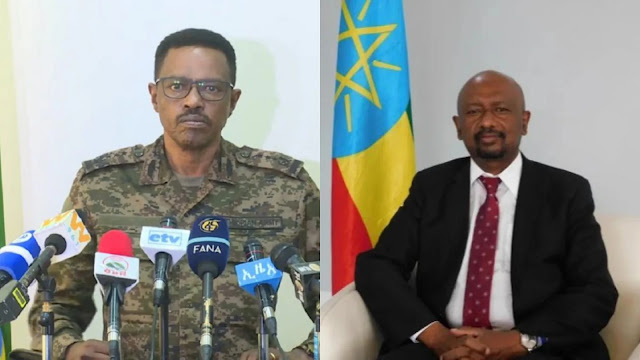 |
| LEFT: General Bacha Debele and Dr. Sileshi Bekele |
By Alemayehu Dessu
— a Sociologist and a Researcher
The Office of the President yesterday announced the appointment of 27 Ambassadors and some of the names in the list have shocked many Ethiopians. But it should not be so.
The appointment of General Bacha Debele, senior member of ENDF, and Dr. Sileshi Bekele, GERD Negotiator and Minister of Water, as Ambassadors among others has shocked many because most believe these men were fulfilling their responsibilities to their fullest capacities and some felt they should be left where they are.
The first misconception here arises from the notion that being assigned as an Ambassador is the same as being pushed away from the center stage of Ethiopian politics. This perception was instilled when the EPRDF government was in power and usually the EPRDF leadership, when they are dissatisfied with a certain official they appoint them as Ambassadors somewhere in the world and keep them at bay from the center of politics. Hence, Ethiopians were, unfortunately, accustomed to believing that being assigned as an Ambassador is a punishment rather than recognition for their good service. However, EPRDF’s style of appointing an Ambassador has cost Ethiopia a lot, especially now when it needed its Ambassadors to actively resist the foreign pressure directed towards Ethiopia.
The second perception is that like most Africans, Ethiopians are accustomed to believing that their countries lack qualified and responsible people. Hence, when the likes of General Bacha and Dr. Sileshi, who once had the opportunity to be seen publicly throughout Ethiopia and the world, are given a new role, people automatically think the government is making a big mistake. This is a dangerous pattern of thinking that breeds dictators. There are many Ethiopians who are capable of replacing those giants.
Third, historically we Ethiopians are also accustomed to believing that when a leader dies or departs, there will be an apocalypse immediately. After the death of the late Prime Minister Meles Zenawi this was the case. But Ethiopia moved on.
But the fact remains that foreign relations from here onwards will be Ethiopia’s center stage in politics and anyone who is at the frontline of this role holds the biggest responsibility. And Ethiopia has many competent and responsible men and women but just because they are not publicly seen, it does not mean the country lacks competent personnel. What they lack is the opportunity to serve their country. Finally, if we wish for Ethiopia to succeed in all sectors, we must let go of the thinking that attaches us to one single person. We must avoid building a cult of personality. We must instead learn to give a chance to others who might be as capable as or even better than their predecessors.
--
Alemayehu Dessu is a sociologist and a researcher. He can be reached at lijalex@yahoo.com.
Comments
Post a Comment